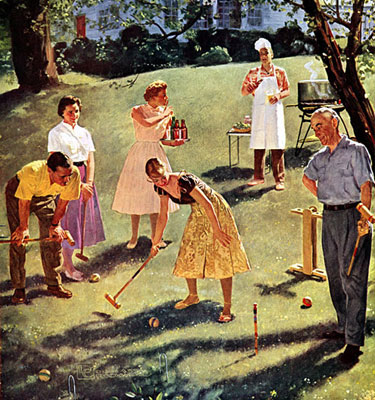 All dressed to the nines in my jaw dropping, turquoise evening gown with my hair in a bun, bright red lipstick mostly on my lips and flat shoes hidden under all that flowing satin. No high heels on when I crossed a major street- my mother’s rule, too dangerous. Did she not notice everyone always stopped to let me cross? I would have been fine with high heels. Yes, of course my evening gown had a plunging neckline and it did need a few extra safety pins to look proportionally correct on my six-year-old frame.
All dressed to the nines in my jaw dropping, turquoise evening gown with my hair in a bun, bright red lipstick mostly on my lips and flat shoes hidden under all that flowing satin. No high heels on when I crossed a major street- my mother’s rule, too dangerous. Did she not notice everyone always stopped to let me cross? I would have been fine with high heels. Yes, of course my evening gown had a plunging neckline and it did need a few extra safety pins to look proportionally correct on my six-year-old frame.
I would cross the busy avenue solo, while all my second mothers watched from the many windows to make sure I arrived safely at my favorite place, Jay’s Diner. I ate at the diner 2 or 3 times a week for my mid-afternoon snack. We ate late because my parents worked late, so mid-afternoon snacking was very encouraged at our house.
The heads of the five hard working ladies of the diner would spin as I walked in the door, every time, perhaps because I was always a bit overdressed for the venue. As I’d pull my floor length satin dress and me up onto the tall pedestal seat the grill cook always said, “the usual?” Yes, 2 hamburgers, loaded, medium rare, a large order of french fries and please, save me a dish of grapenut pudding. “Lots of the whipped cream, thank you.” I was a regular diner patron.

 Even in turbulent time like these there are certain constants in life – like noodles. Noodles have played a very important role in my life. Whenever I got sick my mother would cook luchen (‘luxshun’ for those jews and non-jews unfamiliar with yiddish pronunciation) and cheese. I have vivid recollections of her bringing me a steaming bowl (not just a bowl but a BOWL) of wide egg noodles (like pappardelle but eggier and chewier) bathed in butter, cottage cheese, cream cheese, cinnamon and a touch of sugar and salt. It was the only thing I had to look forward to when I got sick. If the noodles were hot enough, the sugar and butter would melt into a glaze over the whole dish. And in college when I got sick I would routinely make myself a bastardized version of the dish usually with just spaghetti, salt, butter and cottage cheese. As I got older and began moving around the country for different jobs the luchen and cheese unfortunately receded into my history.
Even in turbulent time like these there are certain constants in life – like noodles. Noodles have played a very important role in my life. Whenever I got sick my mother would cook luchen (‘luxshun’ for those jews and non-jews unfamiliar with yiddish pronunciation) and cheese. I have vivid recollections of her bringing me a steaming bowl (not just a bowl but a BOWL) of wide egg noodles (like pappardelle but eggier and chewier) bathed in butter, cottage cheese, cream cheese, cinnamon and a touch of sugar and salt. It was the only thing I had to look forward to when I got sick. If the noodles were hot enough, the sugar and butter would melt into a glaze over the whole dish. And in college when I got sick I would routinely make myself a bastardized version of the dish usually with just spaghetti, salt, butter and cottage cheese. As I got older and began moving around the country for different jobs the luchen and cheese unfortunately receded into my history.  My nephew, who lives in a tiny New York apartment, called me with a recipe emergency. He’d invited a new Potential Girlfriend (PGF) over for dinner and wanted to cook something that was cheap and easy but impressive. I thought this was ambitious for a guy whose cooking skills are limited to pouring cereal and microwaving popcorn, but I had an idea.
My nephew, who lives in a tiny New York apartment, called me with a recipe emergency. He’d invited a new Potential Girlfriend (PGF) over for dinner and wanted to cook something that was cheap and easy but impressive. I thought this was ambitious for a guy whose cooking skills are limited to pouring cereal and microwaving popcorn, but I had an idea. Every summer when we were kids, my brother and I would visit my grandparents on Lake Minnetonka in Orono, Minnesota. We spent some of our days waterskiing on Mud Lake, seeing plays at the Guthrie, and riding the rollercoaster at Mall of America. But most of our WASPy Midwestern days were spent at the Woodhill Country Club playing tennis or lounging poolside. Many teenagers were bored by Woodhill’s sea of Lilly Pulitzer sundresses and Brooks Brothers’ monogrammed golf-sweaters, but I was fascinated. I was convinced (since I was a teenage TV junkie) the Woodhill Country Club, built among some the largest estates of suburban Minneapolis, was built on a bedrock of scandal.
Every summer when we were kids, my brother and I would visit my grandparents on Lake Minnetonka in Orono, Minnesota. We spent some of our days waterskiing on Mud Lake, seeing plays at the Guthrie, and riding the rollercoaster at Mall of America. But most of our WASPy Midwestern days were spent at the Woodhill Country Club playing tennis or lounging poolside. Many teenagers were bored by Woodhill’s sea of Lilly Pulitzer sundresses and Brooks Brothers’ monogrammed golf-sweaters, but I was fascinated. I was convinced (since I was a teenage TV junkie) the Woodhill Country Club, built among some the largest estates of suburban Minneapolis, was built on a bedrock of scandal.
 Easter. “Eater” with a full stomach, the inevitable outcome on any
day replete with decorated eggs, chocolate bunnies, ham, lamb, brisket
for the polydenominational and, for the faithful, whatever they have
given up for Lent.
Easter. “Eater” with a full stomach, the inevitable outcome on any
day replete with decorated eggs, chocolate bunnies, ham, lamb, brisket
for the polydenominational and, for the faithful, whatever they have
given up for Lent.

